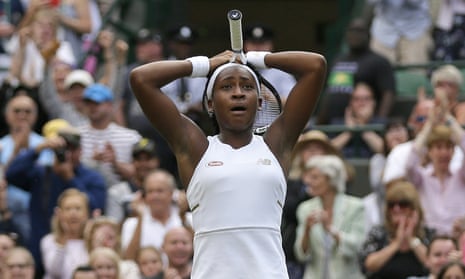One of the most embarrassing things that ever happened to me played out in Wimbledon. Venus and Serena Williams were renting a house on the road where I grew up. Like me, they were barely out of their teens – Venus had just turned 20 – but while I had just finished my A-levels, they were busy tearing up 120 years of tennis history. That was the first year Venus won Wimbledon, which prompted my mum to insist on baking a cake, frogmarching our whole family up the road, and handing it over to the bemused Williams sisters, declaring that as the mother of two black girls, she knew exactly how they felt.
I was mortified, but in hindsight I rate my mum for this. She looked at the Williamses and saw role models for her own daughters. And she was right. The arrival of Venus and Serena had a profound impact on me and my sense of self. Their skill was so exceptional, even in an environment that proved repeatedly hostile – becoming the best athlete of her generation didn’t stop the press trolling Serena. They literally changed the game.
But what really inspired me about the sisters was that they did so while unapologetically owning their cultural identity – wearing their braids with white beads, bringing their Compton family with them, Serena once even raising a fist in a gesture reminiscent of Tommie Smith and John Carlos’s black power salute at the 1968 Mexico City Olympics.
So it was no surprise to me that, when 15-year-old Cori Gauff triumphed at Wimbledon on Monday, she turned her defeat of Venus into a tribute to Venus. Gauff is remarkable – she is the youngest player to qualify for the main Wimbledon draw, and won the French Open girls’ singles aged just 14. She was so in awe of Venus, she was too scared to even speak to her, so large had the elder Williams loomed in her consciousness. “I wouldn’t be here if it wasn’t for her,” Gauff said.
Everyone needs role models. The classic formation of why role models matter – “you have to see it to be it” – is really a slogan for a deeper truth. It’s nearly 60 years since books such as Psycho-Cybernetics revealed just how influential self-image is to our psychology. If you have a role model at that crucial, formative stage, providing a positive image of what you can be, you are more likely to create a positive self-image too.
My own self-image was built from a mishmash of different role models: writers, journalists, lawyers, film-makers – women doing the things I have aspired to do, in a way that has opened doors for other young women.
Role models don’t have to be from the same race or culture as you, and mine have not all been black. But it was only when I went to Ghana for the first time, aged 14, that I realised why it helps. I will never forget my astonishment, landing at the airport’s arrivals terminal, to find that the immigration officials, the artists who’d painted the murals, the news anchors on the TV, the judges in robes on the news, and the president himself, framed on the wall, were all black. Only then did I realise that previously, I’d had no image of a world in which black people could be in charge.
That’s why one of the goals of white supremacy was to destroy the self-image of people who were not white, by telling them they were ugly, inferior and incapable. The architects of the slave trade, and the British empire, for example, realised that if you break the link between images of greatness and other races, you limit the potential of future generations.
This legacy cannot be dismantled on Glastonbury’s main stage or the tennis courts of Wimbledon. But it’s a start. Not just because Stormzy was raising the profile of black British culture – which he was – but because he did so with a spirit of confidence and fearlessness, his Union Jack stab vest as a commentary on knife crime and police cuts, just as he last year dedicated his Brits performance to the victims of Grenfell Tower. He has also become a philanthropist – creating a scholarship to send four black British students to Cambridge University – and a publisher, with his imprint Merky Books. Stormzy is giving young black people an image of someone who is thinking big.
And when you see Raheem Sterling depicted as a black angel on the cover of GQ, you get a sense of how a sports star can flip the script, from being caricatured by the tabloids to speaking out powerfully against racial injustice. And people listen, because Sterling is one of the best football talents of our generation – and used that standing to speak out on behalf of us all.
For me, it’s neither celebrity nor fame that makes role models of this new generation, not even their particular talent – my role models have been lawyers and historians as much as footballers and rappers. But what I do find inspiring is their intent to create potent new ingredients for our self-image. And I know first-hand the power of that.

